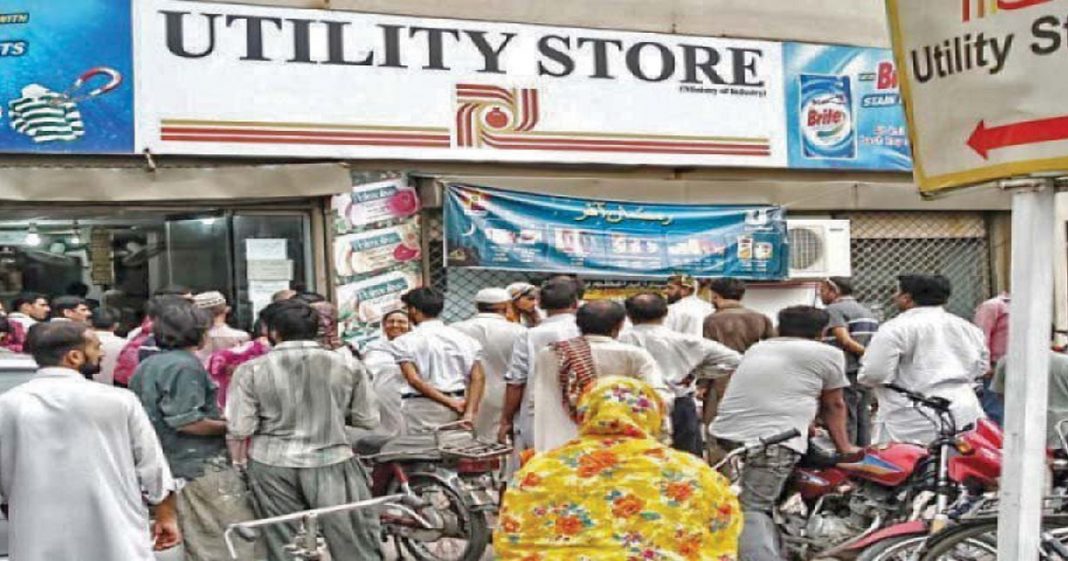Pakistan’s federal government has announced plans to shut down utility stores across the country due to severe financial constraints, a decision poised to affect millions of low-income families who rely on these stores for essential goods at discounted prices. The closure plan, communicated by Industry and Production Ministry Secretary Saif Anjum during a Senate Standing Committee briefing, is part of a broader effort to cut costs amid insufficient funds to maintain operations.
The utility stores have long been a lifeline for many, providing up to 25% discounts on basic necessities such as flour, ghee, rice, sugar, and pulses. However, the government recently halted a crucial Rs50 billion subsidy, leaving approximately 26 million households without this essential support. With the stores now set to sell goods at regular market prices, the financial burden on these families is expected to increase significantly.
In the briefing, Secretary Anjum outlined the closure plan and proposals from the Rightsizing Committee, which includes shutting down other government entities as well. The decision to close utility stores and redirect the funds to address the ongoing energy crisis—specifically to provide relief on electricity bills—reflects the government’s difficult choices in balancing fiscal responsibility with public service.
Broader Privatization Effort Underway
The planned closure of utility stores is not an isolated event but part of a more extensive privatization strategy initiated by the federal cabinet earlier this year. The government has approved a five-year privatization program to be executed in three phases, targeting various state-owned enterprises for privatization. The first phase involves Pakistan International Airlines (PIA), House Building Finance Corporation (HBFC), and several electric supply companies.
Subsequent phases will see the privatization of major entities such as LESCO, MEPCO, PESCO, HESCO, SEPCO, Utility Stores Corporation, State Life Insurance Corporation, and Pakistan Re-Insurance Company. This sweeping move towards privatization aims to reduce the government’s financial burden and streamline operations within these organizations.
Additionally, the Rightsizing Committee has recommended the closure of 16 government departments, including the Pakistan Engineering Council and National Fertilizer Corporation. These closures are scheduled to take place within a one-week to three-month timeline, signaling the government’s urgent need to reduce operational costs and focus on essential services.
Read More: PTA Admits Firewall Installation, Digital Freedom Threatened
Impact on Low-Income Families and Employees
The closure of utility stores will have a profound impact on low-income families, who have relied heavily on the subsidies provided through these outlets. With the removal of these subsidies, the affordability of essential goods will become a significant issue for millions, exacerbating the economic challenges faced by Pakistan’s most vulnerable populations.
The decision has also sparked concerns among the over 18,000 employees of the Utility Stores Corporation, who are contemplating protests against the closures. The potential loss of jobs adds another layer of complexity to the government’s decision, as these employees face an uncertain future. In response, the government is considering a package for affected employees, although details have yet to be finalized.
The Senate Standing Committee has been informed that the closure plan will be reviewed and approved by the cabinet secretary before being presented to the cabinet for final approval. Once approved, a timeline will be set for the nationwide closure of utility stores. The move reflects the government’s broader strategy of rightsizing and privatization but also underscores the tough choices being made in the face of economic adversity.
As the government navigates these challenges, the impact on both the economy and society will be closely watched. The balance between fiscal responsibility and the provision of essential services will be critical in determining the long-term success of these measures, as Pakistan grapples with its financial realities.














